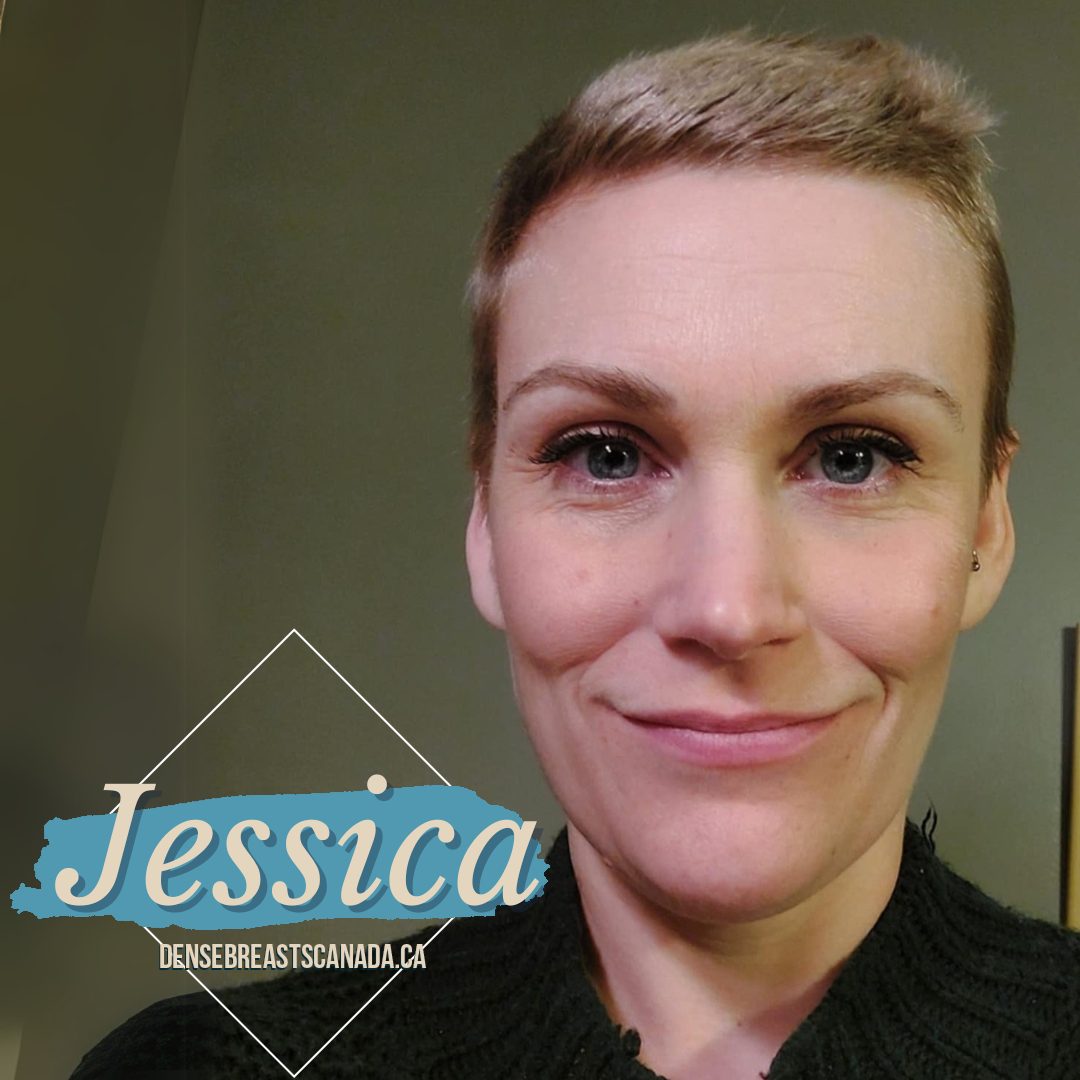Jessica

I was 34 years old.
It was the end of February, 2023, 7 months since the physical with my family doctor. Not one, but two lumps were found-one in each breast, almost identical in their 3 o?clock location.
I had found one lump prior to the visit; the other was found by my doctor during the breast exam she performed upon hearing of my discovery. She immediately suggested having the second one examined further.
I wasn?t sure how long I had been aware of the little blobby in my right breast. I hadn?t been concerned about it; as far as I knew, my risk was low and I had no reason to be suspicious. Having been unable to get in to see my doctor for about 2 years, I mentioned the lump anyway.
I am thankful that we reconnected when we did; that she heard me, advocated for me, and had further testing done.
Who knows how cells might have progressed, and where I would be in telling my story, had action not been taken.
Seven months, three ultrasounds, one mammogram, one biopsy and a phone call later, I was in my work office during morning break when I listened to… ?invasive ductal carcinoma. Breast Cancer… the most common…stage 1…grade 2… It will all be explained more?.
A further biopsy of the second lump returned with identical results. A meeting was held with a professional team from Breast Health, myself, and my partner. Despite a few concerns, there were many factors in our favour. First and foremost, we caught it early. Also, because of the nature of the tumor, we had several treatment options and paths moving forward. Further, I was young and otherwise in great health.
Opportunities to participate in research studies and genetic testing were offered. After, I was told by one researcher my situation was, ?strange…such a young age…in good health…no family history…absolutely no markers on the 80+ most common genes we tested…just a case of sh*t luck…?.
Lovely.
When I had surgery (double lumpectomy and bi-lateral lymph node biopsy), just 2 months after the diagnoses, we learned it had spread to my lymph nodes and was now stage 2, bordering stage 3. Treatment plans adjusted and we began chemotherapy, followed by radiation and now ongoing hormone therapy. I continue to experience side effects which include neuropathy (tingling/numbness of fingers, in my case); hot flashes and muscle/joint stiffness initially related to chemotherapy and now due to drug-induced menopause; inflammation in the neck, shoulders and chest from radiation; brain fog and a decline in my stamina/energy.
The long-term impacts of treatment on my heart and the health of other organs, such as kidneys and liver, are uncertain.
There is also the aspect that because my cancer spread away from the breast tissue, it could present later in other organs.
Why am I sharing my story? Given my medical history, age, race, overall health, and lifestyle habits, my risk would be considered low. I highly doubt I would have been granted testing or been considered for ultrasounds or mammograms had I wanted to navigate the health of my breasts without a prior illness and no family history. I ask myself, would I have known where or how to access the appropriate resources without my doctor?s engagement and having the means I (fortunately) have to access those resources? Without access to the system, the appropriate direction and resources are not readily available, as there is no provision for preventative testing in younger adults.
Knowing my body, and having always had an awareness of physical and mental health led me to notice changes within my body. Being surrounded by people who value and discuss preventative healthcare and recognize the importance of regular visits to health care providers, I have the confidence to interact and engage with medical professionals, and the knowledge of what to expect or request during medical visits. My family doctor is someone with whom I have a history and relationship, whom I am comfortable with, and who listens to me.
In sum, I had the confidence, language, ability, and awareness of when and how to express myself clearly to be heard and understood by a family doctor who got me into the system. I have thought of all the factors that contributed to my early diagnosis and my experiences at each step of my cancer journey, and of the barriers and factors others face. Early detection ultimately resulted in fewer invasive and intensive treatments; a better outcome for my health moving forward; and far less financial impacts to our health care system.
DBC NOTE: Jessica, Thank you for bravely sharing your story. It?s impossible not to feel the weight of what you?ve been through and the gratitude you hold for early detection and the care you received. Your experience highlights so many critical issues?the importance of knowing your body, advocating for yourself, and having a trusted relationship with a healthcare provider who listens and takes action. Your story will bring attention to the gaps in our healthcare system that must be addressed. Thank you for using your voice to advocate for change and to encourage others to listen to their bodies, seek care, and push for the resources they need.
